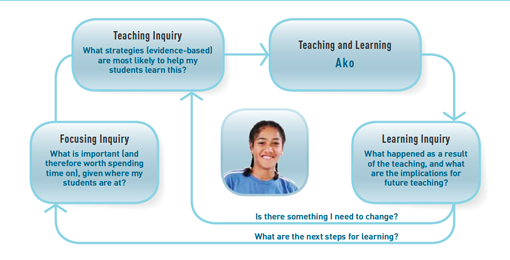Inquiry
Inquiry has been described as “the organised pursuit of curiosity.” (Stenhouse, 1981)
Teacher Inquiry into Student Learning
This week, in this course we are covering Teacher Inquiry into Student Learning, and in the digital and collaborative course we are covering inquiry learning. Team Solutions (2009) make the distinction between them as follows:
| Inquiry Learning (DIGITAL) | Teacher Inquiry (LEADERSHIP) |
| A process where students co-construct their learning in an authentic context | Where teachers inquire into their own practice and use evidence to make decisions about ways to change that practice for the benefit of the student |
2. Professional Learning
In the Standards for the Teaching Profession (Education Council, 2017), the professional learning standard explicitly refers to inquiry: "Use inquiry, collaborative problem solving and professional learning to improve professional capability to impact on the learning and achievement of all learners." (p.18)
Three of the elaborations of this standard provide further explicit links to teacher inquiry:
- Inquire into and reflect on the effectiveness of practice in an ongoing way, using evidence from a range of sources
- Engage in professional learning and adaptively apply this learning in practice.
- Be informed by research and innovations related to: content disciplines; pedagogy; teaching for diverse learners, including learners with disabilities and learning support needs; and wider education matters.
Teaching as Inquiry
The NZ Ministry of Education provides a series of web pages explaining what they define as Teaching as Inquiry there are several diagrammatic versions of the model proved, but all are similar to this one.

The Spiral of Inquiry
This is described on the MoE's TKI website as “a fresh rethink on the structure of teaching as inquiry.” (Ministry of Education, 2015). It emphasises involvement of learners, their families and communities and developing learner agency. It states that engaging in inquiry is a process of developing collective professional agency either within a school or across a cluster of schools. The approach is described in Timperley, Kaser and Halbert (2014). They emphasise agency and collaboration: "Engaging in inquiry is a process of developing collective professional agency either within a school or across a cluster of schools”, and “Nor can leaders decide what the focus of their inquiry should be. It is the collaborative inquiry process that matters”
The Spiral Playbook (Kaser & Halbert, 2017) provides an accessible overview of how to use the Spiral of Inquiry. It is included in this week's media and we will be using it in the face to face sessions.
Which Inquiry Models are teachers using?
For the flipped preparation we asked you till fill in a form to say which teacher inquiry model(s) you are using. The form can he found at tinyurl.com/TMLteacherinquiry and we will share the results in class. Previous intakes have indicated that about half of teachers have used the Teaching as Inquiry model, while the other half used the Spiral of Inquiry, along with a handful of other models.
The online part of the programme will centre around your teacher inquiry.
Your inquiry can relate to any of the topics we’ve studied during the first 16 weeks, and you’ll still have access to those weeks’ content in the portal while studying online.
During the 16 weeks you will design an action plan informed by community needs and insights from research. You will then carry out the initial cycle of a Spiral of Inquiry while writing a series of reflections on different aspects of your inquiry.
References
Education Council. (2017). Our Code Our Standards: Code of Professional Responsibility and Standards for the Teaching Profession. Retrieved from https://educationcouncil.org.nz/sites/default/files/Our%20Code%20Our%20Standards%20web%20booklet%20FINAL.pdf
Hubbard, R. & Power, B. (2003). The Art of Classroom Inquiry: A Handbook for Teacher-Researchers (Revised Ed.). Portsmouth, NH: Heinemann.
Kaser, L. & Halbert, J. (2017). The Spiral Playbook: Leading with an inquiring mindset in school systems and schools. C21 Canada. Retrieved from http://c21canada.org/wp-content/uploads/2016/10/Spiral-Playbook.pdf
Ministry of Education. (2015). Before You Start. Retrieved from http://nzcurriculum.tki.org.nz/Teaching-as-inquiry/Before-you-start
Team Solutions. (2009). Thinking about Inquiry. Retrieved from http://teamsolutions.wikispaces.com/Teaching+as+Inquiry
Timperley, H., Kaser, L. & Halbert, J. (2014). A framework for transforming learning in schools: Innovation and the spiral of inquiry. Centre for Strategic Education. Retrieved from http://www.educationalleaders.govt.nz/content/download/74475/611763/file/Spiral%20of%20Inquiry%20Paper%20-%20Timperley%20Kaser%20Halbert.pdf
No comments:
Post a Comment